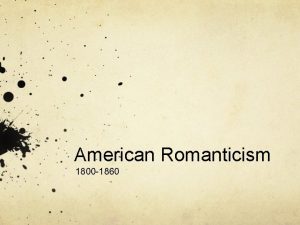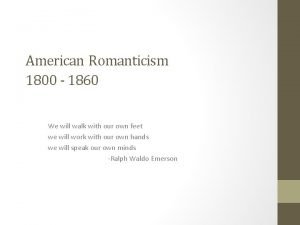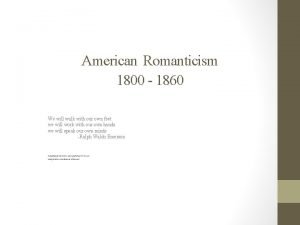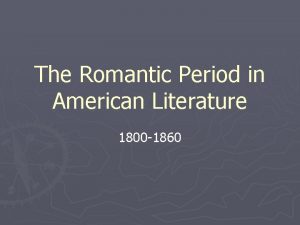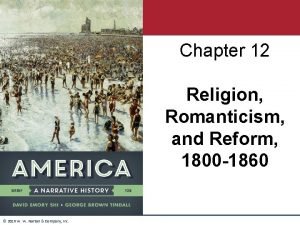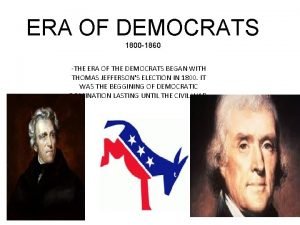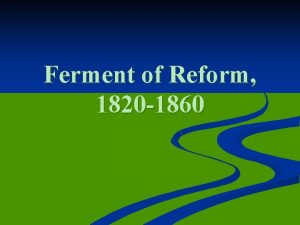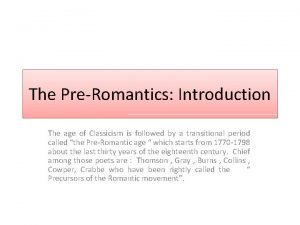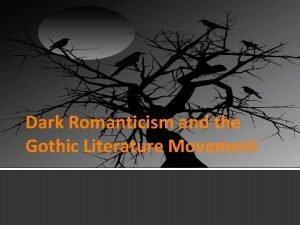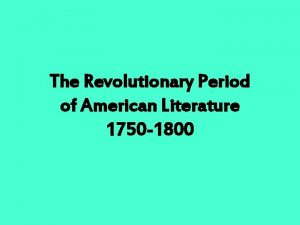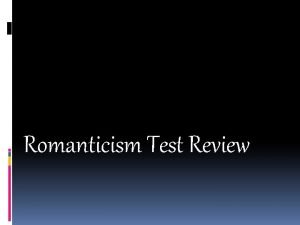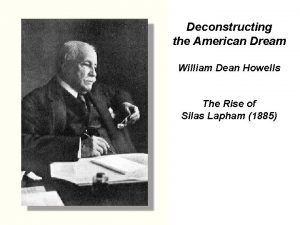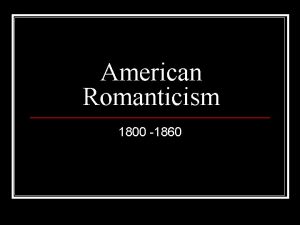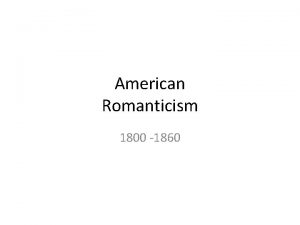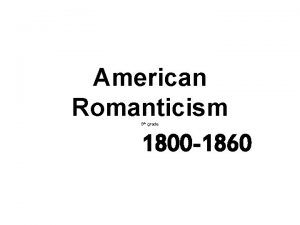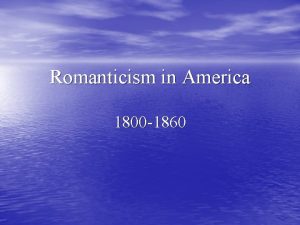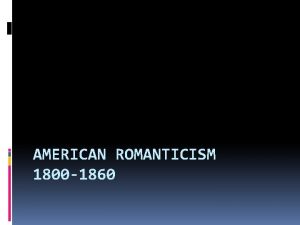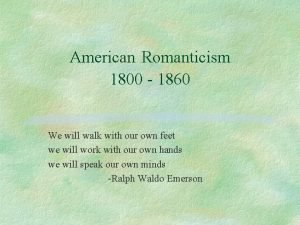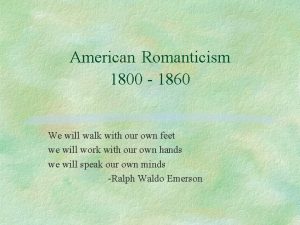American Romanticism 1800 1860 We will walk with












- Slides: 12

American Romanticism 1800 - 1860 We will walk with our own feet we will work with our own hands we will speak our own minds -Ralph Waldo Emerson

Political and Social Milestones § The Louisiana Purchase - 1803 § The Gold Rush - 1849 § Education and Reform

Rationalism vs. Romanticism § The rationalists believed the city to be a place to find success and self-realization § The rationalists believed that human beings can arrive at truth by using reason, rather than by relying on the authority of the past, on religious faith, or intuition § The romantics associated the countryside with independence, moral clarity, and healthful living § The romantics believed that the imagination was able to discover truths that the rational mind would not reach § The romantics did not flatly reject logical thought as invalid for all purposes; but for the purpose of art, they valued the “felt” experience

Characteristics of American Romanticism § Values feeling and intuition over reason and intellectualism § Places faith in inner experience and the power of the imagination § Shuns the artificiality of civilization and seeks unspoiled nature § Prefers youthful innocence to educated sophistication § Champions individual freedom and the worth of the individual § Contemplates nature’s beauty as a path to spiritual and moral development

Characteristics (continued) § Looks backward to the § Sees poetry as the wisdom of the past and highest expression of distrusts progress the imagination § Finds beauty and truth § Finds inspiration in in exotic locals, the myth, legend, and supernatural realm, folklore and the inner world of the imagination

Rising to higher truths § Romantics rose from the dull realities through the exploration of the past and of exotic, even supernatural, realms--the Gothic novel--old legends and folklore § Romantics also rose from the dull realities through the contemplation of the natural world--lyric poetry--its underlying beauty and truth

The New American Novel § While the Romantic poets of the period were staying close to the traditional forms, American novelists were discovering that the subject matter available to them was very different from the subject of European writers l l Limitless frontiers Coincided with westward expansion, growth of nationalist spirits, and the rapid spread of cities § James Fenimore Cooper l l Natty Bumpo - new kind of hero (frontiersman) Virtue was American Innocence. Not European Sophistication

New American Novelists § Herman Melville - (ex-sailor) wrote Moby Dick § Nathaniel Hawthorne - wrote The Scarlet Letter § More a “coming of age” not a renaissance

The Fireside Poets § Opposite of novelists - worked within European literary traditions § Used English themes, meter, imagery with American settings and subjects § Henry Wadsworth Longfellow, John Greenleaf Whittier, Oliver Wendel Holmes, James Russell Lowell

Transcendentalism § The idea that in determining the ultimate reality of God, the universe, the self, and other important matters, one must transcend, or go beyond, everyday human experience in the physical world. § Ralph Waldo Emerson influenced by ancient Greek - Plato § Also based on Puritan belief and Romantic tradition § Based on intuition; optimism § Individualism takes precedence over conforming to society’s wishes § Henry David Thoreau Emerson’s close friend

The Realm of Darkness § Edgar Allen Poe with Hawthorne and Melville known and anti-Transcendentalists or Dark Romantics § Had much in common with Transcendentalists but did not agree that the spiritual facts which lie behind the appearances in nature are necessarily good or harmless. They believed that Emerson was ignoring the Puritan stress on Original Sin § A focus on Gothicism with an exploration of the conflict between good and evil, psychological effects of guilt and sin, and hypocrisy

William Cullen Bryant (1794 -1878) § As an adolescent, Bryant read Lyrical Ballads. The collection of poetry written by Wordsworth and Coleridge changed his life. § Bryant became the first mature American Romantic. § Other Influences: l l the philosophy of Deism (the belief that divinity could be found in nature) The geography of his surroundings( Bryant used his surroundings to express his sense of correspondence between human life and the life of nature) § Bryant became a famous literary figure and an influential voice in religion and politics. l An outspoken liberal, Bryant supported social reform, free speech, and the abolition of slavery.
 American romanticism 1800 to 1860 worksheet answers
American romanticism 1800 to 1860 worksheet answers American romanticism 1800 to 1860 worksheet answers
American romanticism 1800 to 1860 worksheet answers Rationalism vs romanticism
Rationalism vs romanticism The romantic period in american literature
The romantic period in american literature Chapter 12: religion, romanticism, and reform, 1800–1860
Chapter 12: religion, romanticism, and reform, 1800–1860 Whig party beliefs
Whig party beliefs Second great awakening
Second great awakening Pre romanticism
Pre romanticism The romanticism (1795 — 1835) what is romanticism
The romanticism (1795 — 1835) what is romanticism Romanticism and gothic literature
Romanticism and gothic literature Revolutionary period of american literature
Revolutionary period of american literature Characteristic of romanticism
Characteristic of romanticism American gothic romanticism
American gothic romanticism
